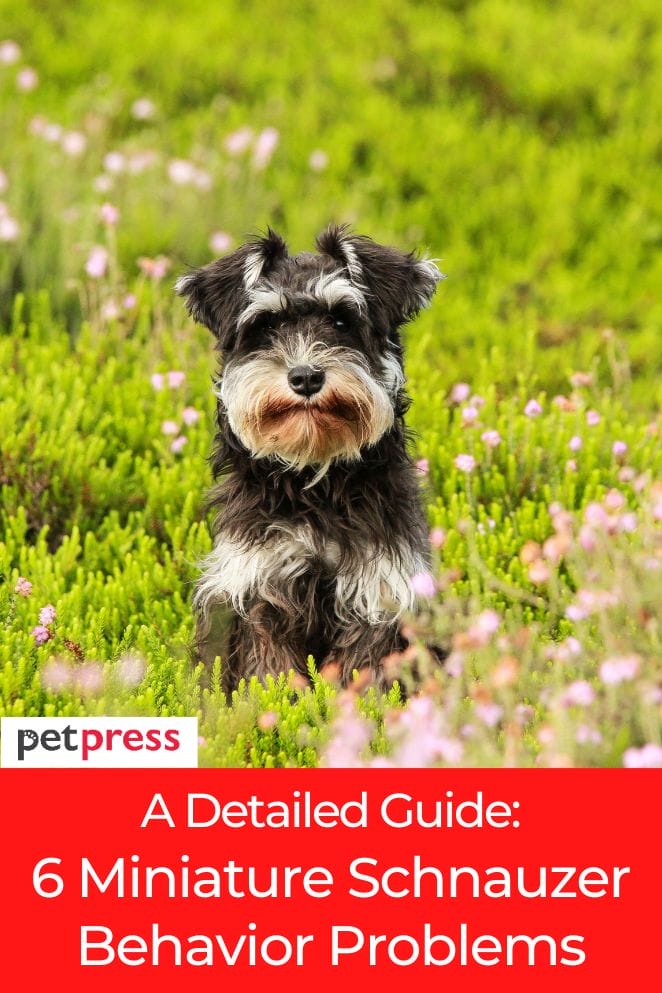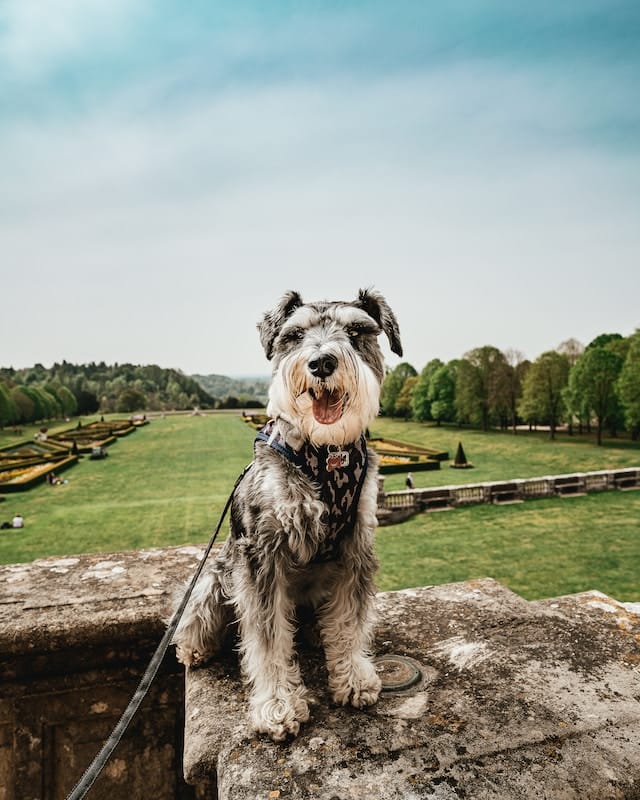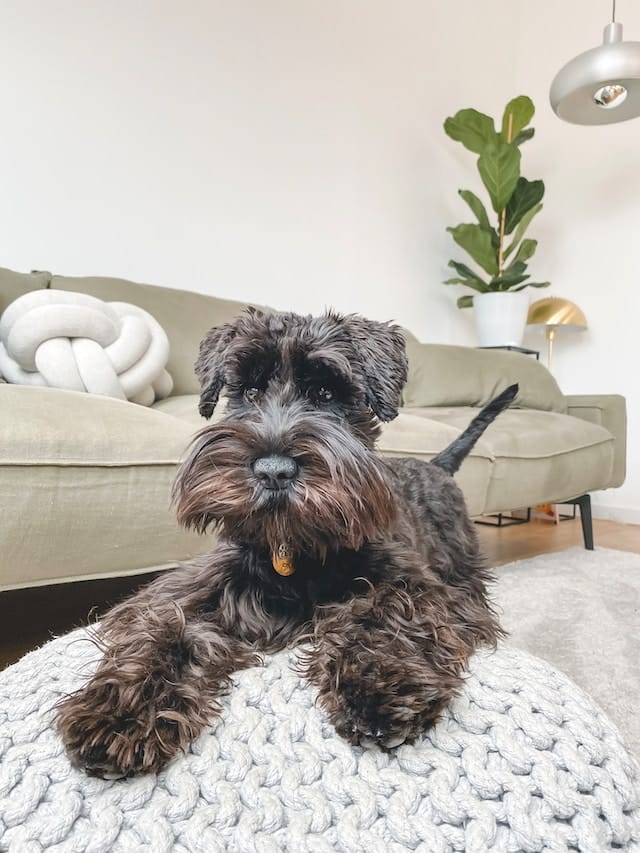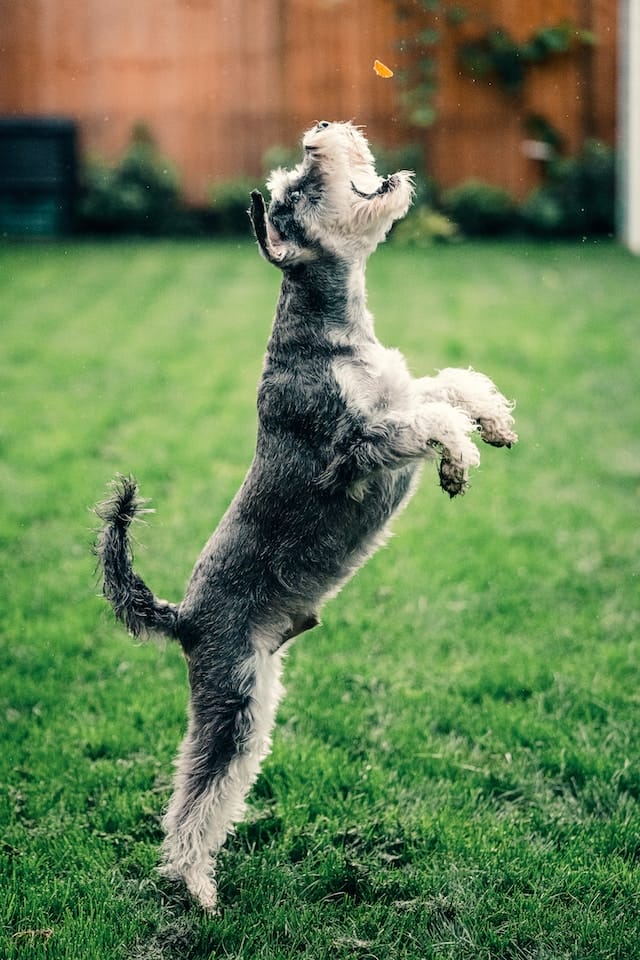
Do you have the pleasure of sharing your life with a spirited and affectionate Miniature Schnauzer?
These little bundles of energy are adored for their vibrant personalities and distinctive appearance.
However, like all dogs, they can occasionally present behavior challenges that might leave you puzzled.
In this article, we’ll bring a profound plunge into the novel traits and characteristics of Miniature Schnauzers, investigate the common behavioral issues they could display, reveal the underlying reasons for these issues, and offer you significant guidance on the most proficient method to forestall and address them.
When you get done with perusing, you’ll have a superior handle on your cherished four-legged friend and how to support a respectful and cheerful expansion to your loved ones.
Miniature Schnauzer’s Characteristics and Traits
Miniature Schnauzers, frequently tenderly referred to as “Schnauzies,” are for sure a remarkable breed with interesting traits and characteristics that charm them to many dog lovers.
We should plunge further into what makes these little canines so unique.
Appearance
Miniature Schnauzers are instantly recognizable due to their distinctive appearance.
Their unique characteristics include a wiry double coat that usually sports shades of salt-and-pepper, black and silver, or solid black.
What sets them apart are those bushy eyebrows and a prominent beard, which combine to give them a charming, almost human-like expression.
Their perky ears stand tall, adding to their alert and inquisitive appearance.
Size
As the name suggests, Miniature Schnauzers are a smaller version of their Standard Schnauzer counterparts.
They typically weigh between 11 to 20 pounds (5 to 9 kilograms) and stand around 12 to 14 inches (30 to 36 centimeters) tall at the shoulder.
Temperament
These dogs have hearts as big as their personalities.
They’re incredibly affectionate and thrive on human companionship.
In fact, they often form deep bonds with their families.
Loyalty is a hallmark of the Miniature Schnauzer, and they take their role as protectors seriously.
Despite their small stature, they have a formidable bark that can put off potential intruders, making them excellent watchdogs.
Intelligence
Miniature Schnauzers are highly intelligent dogs.
They are quick learners and excel in various dog sports and activities, including obedience, agility, and even tracking.
Their sharp minds require mental stimulation, so engaging them in puzzle toys or interactive games is a great way to keep them mentally active.
Energy level
Despite their small size, Miniature Schnauzers have boundless energy.
They are an active breed that enjoys daily exercise, whether it’s a brisk walk, a game of fetch, or a romp in the yard.
Regular physical activity helps keep them happy and healthy.
Independent nature
Miniature Schnauzers can be somewhat independent and strong-willed.
While this trait can lead to occasional stubbornness, it also means they are not overly clingy and can entertain themselves when needed.
It’s important for owners to strike a balance between providing structure and allowing some independence.
Socialization
Schnauzers tend to get along well with other dogs and can adapt to various social situations when properly socialized from a young age.
Early socialization helps them develop into well-rounded and well-behaved companions.

Common Miniature Schnauzer Behavior Problems
Miniature Schnauzers may have some behavior problems that owners should be aware of and work to address.
Excessive barking
Miniature Schnauzers are known for their vocal nature.
They may bark to alert you to something or just out of excitement.
To address excessive barking, it’s essential to provide them with mental and physical stimulation to keep them engaged.
Training them to respond to commands like “quiet” or “enough” can help manage their barking.
Aggression
Some Miniature Schnauzers can display aggression, especially if not properly socialized.
Early socialization with other dogs and exposure to various people and situations can help prevent aggressive behavior.
Consulting a professional dog trainer or behaviorist may be necessary if aggression becomes a significant issue.
Separation anxiety
Miniature Schnauzers are known for forming strong attachments to their owners, which can lead to separation anxiety when left alone.
To address this, gradually increase the time your Schnauzer spends alone, starting with short periods and gradually extending them.
Provide plenty of mental stimulation through toys and puzzles when you’re not home.
Digging
Digging is a natural instinct for many dogs, including Miniature Schnauzers.
To manage this behavior, provide a designated digging area in your yard with loose soil or sand.
Encourage them to dig in that area and praise them when they use it. Consistent redirection and positive reinforcement can help curb excessive digging.
Nipping or biting
Miniature Schnauzers can playfully nip or bite when excited.
It’s important to teach them bite inhibition from a young age.
If they nip too hard during play, yelp or say “ouch” to signal discomfort, which helps them learn to control their bite strength.
Consistent training and socialization can also help reduce this behavior.
Housetraining
Housetraining can be a challenge for some Miniature Schnauzer owners due to their intelligence and determination.
Consistency is key.
Take them outside regularly, especially after meals and naps.
Reward them when they do their business outdoors. Crate training can also be effective, as dogs generally avoid soiling their living space.

Causes of Miniature Schnauzer Behavior Problems
Understanding the root causes of these behavior problems is crucial to addressing and preventing them effectively. Some factors contributing to Miniature Schnauzer’s behavior problems include:
- Lack of socialization: Miniature Schnauzers are naturally curious and sociable dogs. However, if they do not receive adequate socialization during their critical development stages (usually between 3 and 14 weeks of age), they may become fearful or aggressive towards unfamiliar people, animals, or environments.
- Inadequate training: Miniature Schnauzers are intelligent dogs that require consistent, positive reinforcement-based training. Without proper training and clear boundaries, they may develop undesirable behaviors or become stubborn.
- Boredom and excess energy: Miniature Schnauzers are an active breed with boundless energy. When they do not receive enough physical exercise and mental stimulation, they can become bored and engage in undesirable behaviors to relieve their pent-up energy.
- Health issues: Sometimes, behavior problems can be linked to underlying health conditions. For example, sudden changes in behavior, aggression, or house soiling might be signs of discomfort or pain.
Tips for Preventing Miniature Schnauzer Behavior Problems
Now that you’re aware of the common issues and their causes, here are some tips to help prevent behavior problems in your Miniature Schnauzer:
Early socialization
Start socializing your Miniature Schnauzer from a young age.
Expose them to various people, dogs, and environments in a positive and controlled manner.
This helps build their confidence and reduces the likelihood of fear or aggression towards new experiences.
Consistent training
Utilize positive reinforcement techniques, such as treats and praise, to reward good behavior and discourage undesirable actions.
Consistency in training is key, and it’s important that all family members use the same commands and expectations to avoid confusion.
Regular exercise
Miniature Schnauzers have the energy to burn, and regular exercise is essential to prevent boredom-related behavior problems.
Daily walks, playtime in a securely fenced yard, and interactive games like fetch or agility can help keep them physically and mentally stimulated.
Mental stimulation
Alongside physical exercise, engage your Schnauzer’s sharp mind with puzzle toys, treat-dispensing toys, and training sessions.
Mental stimulation helps prevent boredom and can tire them out just as effectively as physical activity.
Avoid using punishment
Avoid using punishment-based training methods as they can be counterproductive and lead to fear or aggression.
Instead, focus on positive reinforcement to reward desired behaviors.
Patience and consistency in your approach will yield better results.
Routine veterinary check-ups
Regular veterinary check-ups are a must for keeping your Schnauzer healthy.
These visits are essential because they help spot and deal with any underlying health concerns that might contribute to behavior issues.
Adequate rest
Just like humans, dogs need quality sleep to stay healthy and well-behaved. Ensure your Miniature Schnauzer has a comfortable, quiet place to rest and sleep. Puppies, in particular, require more sleep than adult dogs. A well-rested dog is less likely to exhibit irritability and behavioral issues.
Proper diet
Nutrition plays a significant role in your Schnauzer’s overall health and behavior.
Consult with your veterinarian to determine the best diet for your dog’s age, size, and specific needs.
Providing high-quality, balanced dog food can help prevent health problems that may lead to behavioral changes. Avoid feeding them table scraps or foods that are harmful to dogs.

Seek professional help
If you’re dealing with behavior issues that just won’t quit or are getting serious, it’s smart to reach out for pro help. Dog trainers and behavior experts are the ones to turn to.
They’ve got the know-how to figure out what’s causing your Miniature Schnauzer’s behavior and create a customized training plan.
Plus, they’ll work with you to put effective strategies in place to fix things.
Conclusion
It’s clear that Miniature Schnauzers are truly wonderful companions, cherished for their one-of-a-kind personalities.
Nevertheless, like any dog breed, they can occasionally face behavioral challenges influenced by their inherent traits and external circumstances.
By gaining insight into their distinctive characteristics, recognizing common issues, understanding their underlying causes, and taking proactive steps to prevent problems, you can foster the growth of a well-behaved and contented Miniature Schnauzer that brings joy and happiness to your family.
FAQs
Miniature Schnauzers can be excellent family pets, but they should be socialized with children from an early age to ensure a positive relationship.
Miniature Schnauzers have a wiry coat that requires regular grooming. Aim for grooming sessions every 6-8 weeks to maintain their distinctive appearance.
Yes, many behavior problems in Miniature Schnauzers can be addressed and improved with consistent training, socialization, and patience.
Yes, Miniature Schnauzers are alert and protective, making them effective watchdogs while still being affectionate family pets.
- Does Cat Litter Melt Ice? The Complete Guide to Winter Safety - January 30, 2026
- Happy Tail Dogs: Understanding This Common Canine Condition - January 29, 2026
- How Cold Can Outdoor Cats Handle? Feline Winter Safety - January 27, 2026


GIPHY App Key not set. Please check settings